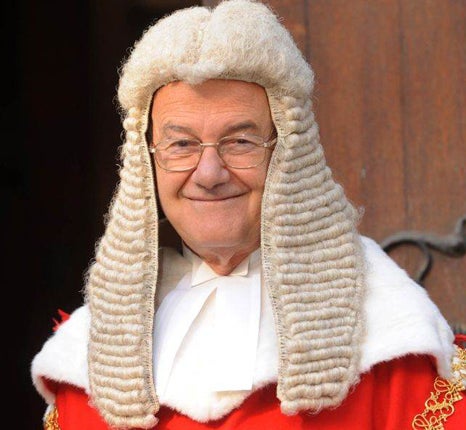Judge's warning over Europe's legal power
Britain's most senior law official attacks influence of Court of Human Rights

Your support helps us to tell the story
From reproductive rights to climate change to Big Tech, The Independent is on the ground when the story is developing. Whether it's investigating the financials of Elon Musk's pro-Trump PAC or producing our latest documentary, 'The A Word', which shines a light on the American women fighting for reproductive rights, we know how important it is to parse out the facts from the messaging.
At such a critical moment in US history, we need reporters on the ground. Your donation allows us to keep sending journalists to speak to both sides of the story.
The Independent is trusted by Americans across the entire political spectrum. And unlike many other quality news outlets, we choose not to lock Americans out of our reporting and analysis with paywalls. We believe quality journalism should be available to everyone, paid for by those who can afford it.
Your support makes all the difference.British courts must have the final say over European human rights law, the country's most senior judge has warned.
In an unprecedented defence of Britain's sovereignty, the Lord Chief Justice, Lord Judge, said that the European Court of Human Rights in Strasbourg is threatening to "assume an unspoken priority over [UK] common law".
In a speech to Inner Temple, published yesterday by the Directorate of Judicial Offices for England and Wales, he asked: "Are we becoming so focused on Strasbourg and the Convention [European Convention on Human Rights] that instead of incorporating Convention principles within and developing the common law accordingly as a single coherent unit, we are allowing the Convention to assume an unspoken priority over the common law?"
The judge continued: "We must beware. It would be a sad day if the home of the common law lost its standing as a common law authority." His intervention, although not intended to be politically controversial, will be seized upon by Eurosceptics who have long argued that judges in Strasbourg have too much influence on affairs in Britain. "What I respectfully suggest is that statute ensures that the final word does not rest with Strasbourg, but with our Supreme Court," said Lord Judge.
Jodie Blackstock, an expert in European law at the civil rights group Justice, said: "The suggestion that we are losing the common law ignores our position in the Council of Europe. It also ignores the approach the Supreme Court has taken to Strasbourg, interpreting its decisions in light of our particular law and procedure."
But Lord Judge warned: "Very often, too often, we are asked to consider decisions from Strasbourg – you see them all listed – which have already been considered or must have been considered in the House of Lords or the Supreme Court. That is the decision which binds us.
"After all, once the Supreme Court has considered decisions of our Court of Appeal, the authority of those decisions evaporates. Who quotes a decision of a Court of Appeal once the Supreme Court has considered the case? No one. Surely we should apply the same rigour to decisions from Europe."
He also warned that changes brought about by the Lisbon Treaty will have a "significant impact" on criminal cases in the UK. The British judiciary, the judge said, will need to be trained to deal with these developments. He predicted that in 20 years' time there would be a very different judiciary to the one today.
But he warned against following the continental model of a "career judiciary". Instead, he urged a new approach to the appraisal system, by assessing part-time judges in court before they are given full-time posts.
The Tory leader David Cameron has said he will act to prevent EU judges gaining greater control over the British criminal justice system by negotiating deals to protect it.
Ms Black said: "The legislation being considered by the EU will build upon Convention rights to create practical, binding measures. This is a positive step. We have nothing to fear from the Luxembourg Court [of Justice] interpreting legislation such as this. For example, the EAW [European Arrest Warrant] is ripe for reform and a ruling by Luxembourg."
Join our commenting forum
Join thought-provoking conversations, follow other Independent readers and see their replies
Comments